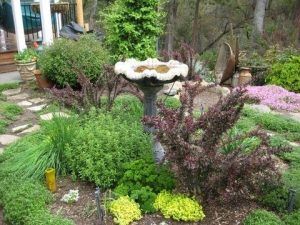Wildlife in the Winter Garden
We gardeners have a love-hate relationship with all kinds of wildlife. As long as the deer, squirrels, raccoons, birds, etc. respect “our” boundaries, they remain loveable, untamed pets. But when Bambi crosses the line that defines our growing space, a mysterious transformation seems to occur. These untamed pets now become a gardener’s worst enemy. Hmmmmm, maybe it is time we make some changes; after all, who is the real trespasser here?
Every bird in your yard is valuable, especially in the winter, and what a mistake it would be not to invite them in. Woodpeckers whack their way into tree bark and plant stems, ferreting out hidden larvae, harmful ants and beetles. Even those scorned starlings earn their stripes, patrolling your lawn with sharp, stabbing beaks for those nasty looking grubs. Fewer pests mean healthier flower gardens, bigger and better vegetables, long-lived trees and shrubs, and less work for you.
Feeders, birdbaths, and birdhouses play a vital role in attracting birds to your backyard garden. But trees, shrubs, and flowering plants can fill the same role without extra effort on your part. Plants provide food, cover, and nesting sites, and since they trap dew and rain, they help provide fresh water as well. When choosing plants, look for food-bearing species that will provide berries, buds and seeds throughout the year. Mix deciduous and evergreen varieties in order to provide cover and shelter all year around. Native species are usually the biggest attractant, and local birds will turn to them first for food and cover. Natives will thrive naturally in your soil and climate and will rarely need you to fuss with fertilizer and extra watering.
DOGWOODS are always a big hit with fall and winter-feeding birds, as they adore the dogwood’s red, shiny berries.
HOLLY attracts at least 12 species which eat its berries. Most of us think ‘evergreen’ when we think of holly, but deciduous types hold great appeal, especially for bluebirds, which seem to find holly berries irresistible. So, when holly berries are ripe, every day is Christmas for the birds.
MANZANITAS with their striking, smooth red bark characterize many of the shrubby species of the southwestern genus. The red or brown berries are prime food for the jays.
Be sure to remember your many feathered friends during the winter time by supplying them with some delicious homemade suet cakes. Melt (1) cup of shortening and (1) cup of crunchy peanut butter in a saucepan at low heat. Add (2) cups of rolled oats, (2) cups of cornmeal, (1) cup of flour, and (1) cup of sugar. Stir well to form a sticky mixture. Spoon into cookie cutters on a waxed paper lined tray, at a depth of no more than (1) inch. Poke a hole in the suet cake near the top, large enough to thread ribbon or string through. Freeze for (1) week, removing each cake from the cookie cutter and peeling off the waxed paper. Thread the ribbon through and hang outside for the birds. They will love you!
Call on the University of California Cooperative Extension Tuolumne County Master Gardeners at (209) 533-5912 or check our website https://ucanr.edu/sites/Tuolumne_County_Master_Gardeners/ with any foothill gardening questions or concerns you might have. Enjoy our late storms that are bringing us so much badly-needed precipitation. No matter how tough times are, be ever so thankful for family, friends and all your blessings.
Betty Hensley is a University of California Cooperative Extension Master Gardener of Tuolumne County who, along with growing prodigious vegetable gardens in the summer, is mindful of the wildlife around her home during the winter.
UCCE Master Gardeners of Tuolumne and Calaveras Counties can answer home gardening questions. Call 209-533-5912 or go to: http://ucanr.edu/survey/survey.cfm?surveynumber=7269 to fill out our easy-to-use problem questionnaire. Check out our website at: http://cecentralsierra.ucanr.edu/Master_Gardeners/ You can also find us on Facebook.

